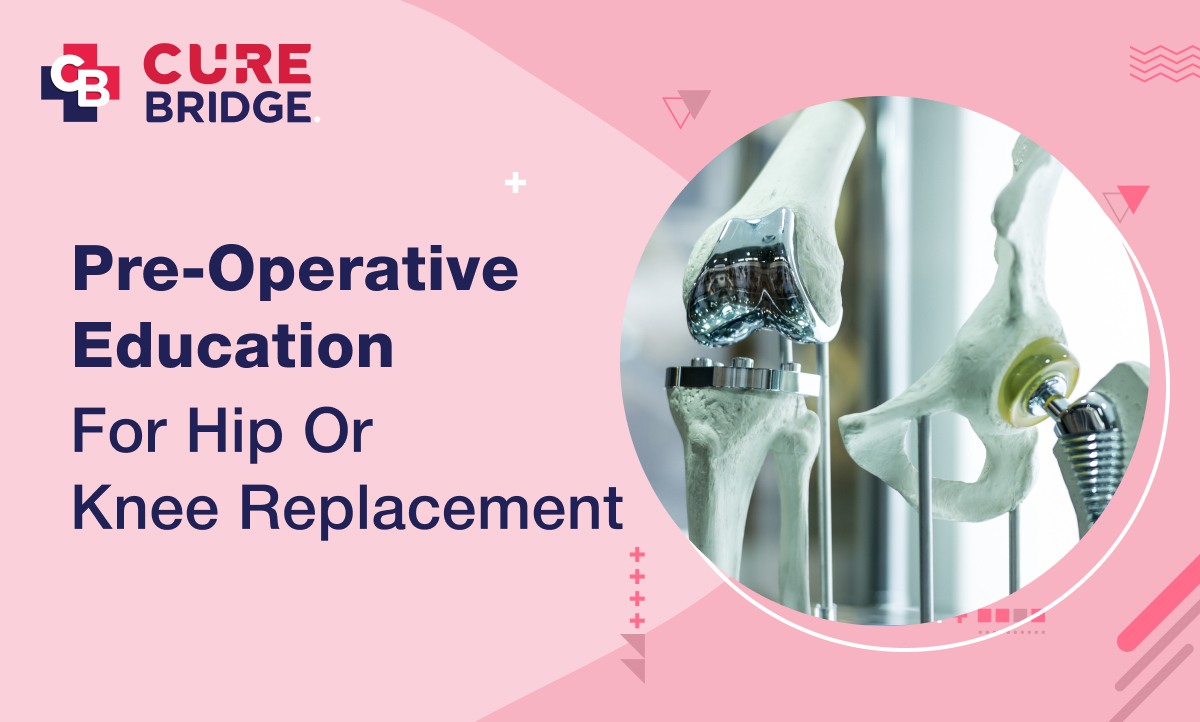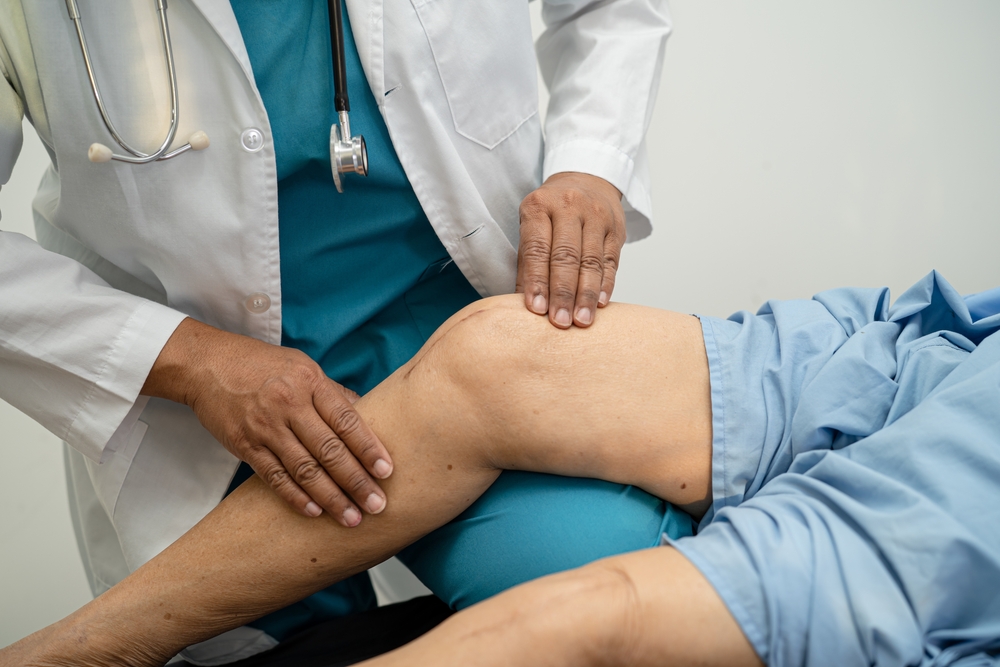
Pre-Operative Education For Hip or Knee Replacement
Hip or knee replacement surgery is one of the most common and effective surgical treatments. It can lead to significant improvements in life. The problem comes with recovery after surgery. Pre-operative education is essential to set you up for a successful recovery.
Understanding Hip or Knee Replacement
Hip or knee replacement is a surgery where doctors replace a damaged hip or knee joint with a new one made of metal, plastic, or ceramic. This is done when the joint is worn out or damaged and causes pain, making it hard to move. The new joint helps you move more smoothly and with less pain, improving your ability to walk and be active.
Knee replacement surgery is a transformative procedure for severe knee arthritis or injury. It offers a chance to return to everyday activities without pain. However, the success of a knee replacement goes beyond the operating room; it starts with well-informed pre-surgical preparation.
Total knee replacement is a significant surgery that replaces the damaged parts of the knee with artificial components. Patients must understand the procedure, its benefits, and the recovery process. This knowledge not only demystifies the surgery but also sets realistic expectations for recovery.

Preparing for Surgery: What You Need to Know
Discussing the cost of knee replacement surgery is integral to pre-operative education. It allows patients to plan financially. To get insights into total knee and hip replacement costs, check platforms like Curebridge, which help find reputable doctors and hospitals and understand treatment options.
The cost of knee replacement surgery in India can vary widely depending on several factors, including the type of surgery (total knee replacement, partial knee replacement, etc.), the hospital or clinic where the surgery is performed, the surgeon’s experience, and the city. Generally, the cost ranges from approximately INR 1,50,000 to INR 4,00,000 per knee. However, these costs can be higher in private and more prestigious hospitals or significant cities.
Like knee replacement, hip replacement is a standard procedure to relieve pain and restore function. The total cost of hip replacement is a consideration for many, but investing in your mobility and quality of life is invaluable. The cost of hip replacement surgery in India starts from approximately ₹280,000. It can go up to ₹350,000 or more, depending on factors such as the hospital, the choice of surgeon, the city where the surgery is performed, and the type of implant and technique used.

Educational sessions before knee replacement surgery cover various topics, from managing post-operative pain to physical therapy exercises. This preparation is critical to a smoother recovery and achieving the best possible outcomes. Pre-operative education for hip or knee replacement is divided into three main phases: preparation before the surgery, activities on the day of the surgery, and post-surgery recovery. Let’s look into it.
Before The Surgery
A comprehensive pre-operative assessment is essential before undergoing knee or hip replacement surgery. This includes medical evaluations to ensure you’re fit for surgery, discussing the risks and benefits, and understanding the surgical procedure. Consider these things to get ready for the procedure.
Educate Yourself
The first step is understanding the ins and outs of knee or hip replacement surgery. This includes learning about the procedure, benefits, risks, and recovery process. Websites like Curebridge offer valuable resources for patients seeking comprehensive information.
Pre-Operative Assessments
Patients undergo a series of assessments to ensure they are healthy enough for surgery. This might include blood tests, X-rays, and evaluations of any existing medical conditions to minimize surgical risks.
Physical Preparation
Some surgeons recommend prehabilitation exercises to strengthen the muscles around the joint, which can aid in a quicker recovery. This is also a time to discuss the cost of knee replacement surgery and plan for post-surgery care.

Logistics and Planning
Arrange for help at home post-surgery, as mobility will be limited. Preparing your living space to make it recovery-friendly is crucial, such as removing trip hazards and ensuring necessities are within easy reach.
On The Surgery Day
This pre-education makes you feel more comfortable showing up for the procedure. Anticipating the following is necessary to be more organized on the surgery day.
Arrival at the Hospital
It is always better to arrive several hours before the scheduled surgery time. This allows for completing any last-minute paperwork, pre-surgery medications, and a final review of the surgical plan with the medical team.
The Procedure
For a knee or hip replacement, patients are given anaesthesia to ensure comfort during the operation. The surgeon then replaces the damaged joint with a prosthetic. The procedure can last a few hours, depending on the complexity and whether it’s a total knee or hip replacement.
Immediate post-op
After surgery, patients are moved to a recovery area closely monitored as they wake up from anesthesia. Pain management starts immediately, and medical staff work to prevent complications like blood clots or infections.

After The Surgery
The procedure is over, which was the hardest part. However, since the recuperation phase is commonly overlooked, you must exercise greater caution. You must bear these points in mind if you want the full benefit of surgery.
Hospital Recovery
Patients typically spend a few days in the hospital post-surgery. During this time, the focus is on managing pain, beginning physical therapy to aid in mobility, and monitoring for any signs of complications.
Home Recovery
Upon returning home, the real work begins. Recovery includes adhering to a physical therapy regimen, managing pain, and gradually increasing activities. Following all post-operative instructions is crucial to ensure the best healing and outcome.
Long-Term Care
Recovery from knee or hip replacement surgery is a long-term process. Most patients see significant improvements within three to six months, though it can take up to a year to fully regain strength and mobility. Regular follow-up appointments are essential to monitor progress.
Financial Planning
Understanding the cost of knee or total hip replacement surgery is part of recovery planning. These discussions should include potential post-surgery therapies and any necessary adjustments to your home to aid recovery.
Final Thoughts
The journey through knee or hip replacement surgery may be tiresome, but if you are well prepared, you can easily sail through it. Proper preparation before the surgery, knowing what to expect on the day, and diligent care after the procedure can lead to a successful recovery and significantly improve quality of life. Curebridge can be a valuable partner in this journey, providing information, support, and resources every step of the way. Visit Curebridge for more information and support on this.
